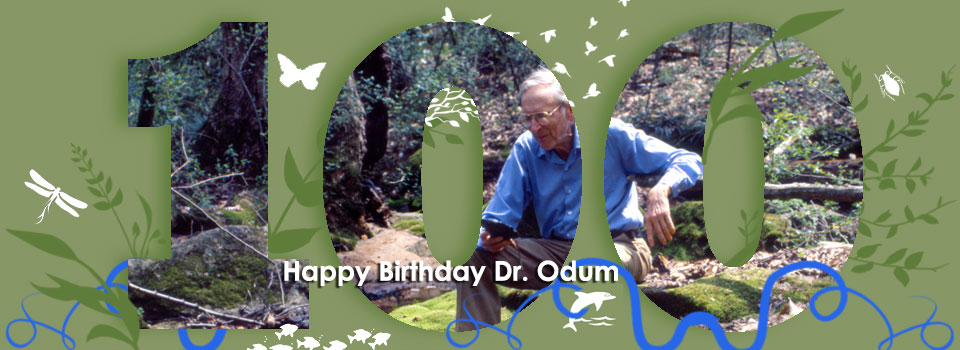The University of Georgia Odum School of Ecology marked a milestone this month: the 100th anniversary of the birth of its namesake and founder, Eugene P. Odum.
The Odum School of Ecology was established in 2007 when the UGA Institute of Ecology, an interdisciplinary research unit started by Odum in 1967, was reconfigured as a college-the first in the world devoted solely to the study of ecology. Much has changed since Odum retired in 1984, but the Odum School remains rooted in his vision of an interdisciplinary, collaborative community of scholars taking a holistic approach to research, teaching and service.
Odum is often referred to as “the father of modern ecology” for his pioneering contributions to ecosystem ecology-the concept of studying whole ecological systems, not just their parts.
“Gene was a champion of holistic thinking and emphasized the importance of the ecosystem as an entity,” said Odum School assistant professor Ford Ballantyne. “His efforts to elevate the status of ecology as a science, to be on par with the other natural sciences, set the stage for ecology and evolutionary biology departments across the country.”
Odum came to Georgia in 1940 as a professor of zoology and immediately set about establishing ecology as a scientific discipline in its own right, penning his influential textbook, “Fundamentals of Ecology.” First published in 1953 and currently in its fifth edition, “Fundamentals” has been translated into numerous languages and remains a foundation for the study of ecology around the world.
Odum’s efforts at expanding resources for scientific research reached beyond the Institute of Ecology. He played seminal roles in the establishment of the Savannah River Ecology Lab and the Marine Institute on Sapelo Island as well.
“I think that Gene would be really quite pleased with how the school has grown and changed,” said professor emeritus and former institute Director Ron Carroll. “Its various foci have shifted over the years consistent with new thinking and theories that have emerged, and new concerns about the environment, but the school continues to take a very holistic approach.”
The school today is also known for conservation ecology, evolutionary ecology, disease ecology, population ecology and aquatic and marine ecology.
“We’ve expanded in a way that embraces ecosystem ecology,” said Associate Dean Sonia Altizer. “The people whose main area falls outside it recognize the repercussions of their work for ecosystem properties.”
Master’s student Shafkat Khan agreed. “The biggest plus for me as an ecologist in training is that there is this tradition of big ideas at the Odum School,” he said. “So many people take such a strong systems view. That, in my view, is Dr. Odum’s legacy here.”
Another way in which the school remains true to Odum’s vision is through its emphasis on service and outreach. Although he was first and foremost a scientist-he was the university’s first Fellow of the National Academy of Sciences, among many other professional honors-Odum understood the importance of communicating about ecology to the general public, and he excelled at it.
“His down-to-earth manner allowed scientists and the public alike to see the relevance and importance of ecology to our everyday lives,” said Odum School Dean John Gittleman.
Odum felt that the scientists at the institute had a responsibility to “do something for the people of Georgia who are paying your salary,” professor emeritus Carl Jordan recalled.
Today, the River Basin Center at the Odum School continues that tradition, conducting research and policy analysis to help communities protect their water resources and aquatic biodiversity, while providing opportunities for students to apply knowledge learned in the classroom to real-world environmental problems.
“Our staff and students respond to, and in some cases anticipate, the needs of natural resource managers and elected officials across the Southeast,” explained Laurie Fowler, Odum School associate dean and co-director of the River Basin Center. “We engage in cutting-edge science to identify how stressors affect the ecology of a region and then develop a menu of management policies to eliminate or reduce that stress.”
The school’s reputation attracts outstanding faculty and students at all levels.
“Our students top the charts,” said Gittleman. Ecology doctoral students, for example, received three of seven National Science Foundation Graduate Research Fellowships awarded to current or incoming UGA students in 2013, and three of four in 2012.
Ecology undergraduates include a high proportion of Honors students and consistently win prestigious scholarships and fellowships including four Udall Foundation Scholarships out of six awarded to UGA students since 2011; two of UGA’s four Goldwater Scholarships since 2012; and three Fulbrights since 2011.
Not surprisingly, Odum School faculty are not only highly regarded researchers but are also recognized for excellence in teaching. Recent accolades include a 2012 Richard B. Russell Teaching Award, a 2011 CURO Excellence in Undergraduate Research Mentoring Award, and a 2011-2013 Lilly Teaching Fellowship.
The school carries on the collegial, collaborative atmosphere that Odum fostered.
“The thing that makes the Odum School stand out is the community that’s been cultivated here,” said doctoral student Virginia Schutte. “At the faculty, grad and undergrad levels, this is the most supportive environment I have ever worked in. The people in the Odum School make this an incredibly stimulating place to get science done.”
Ballantyne agreed. “Prior to becoming the Odum School, the institute was one of the most dynamic intellectual arenas for studying ecology, bringing together researchers from many disciplines,” he said. “As we move into the future, one of our main goals for the school is to foster dynamism, open-mindedness and holistic thinking in our research and interactions.”
“I think that Gene would be really quite proud,” concluded Carroll.


